Travelling Docudays UA: the First Inclusive Screening of Documentary Film for Kharkiv Residents
Travelling Docudays UA: the First Inclusive Screening of Documentary Film for Kharkiv Residents
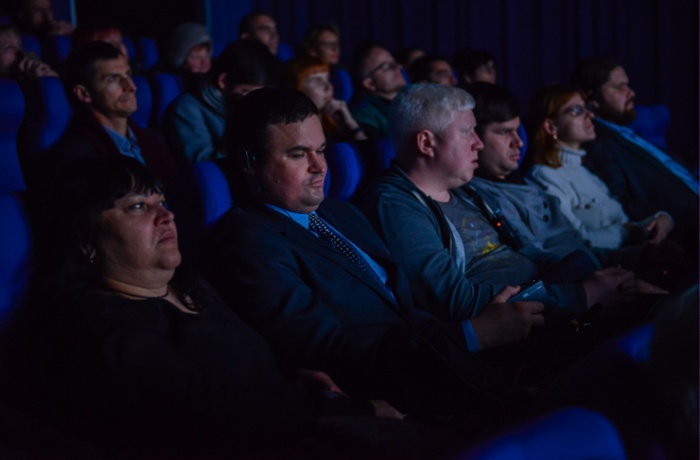
On November 21, on the day of Dignity and Freedom, the 15th Travelling International Human Rights Documentary Film Festival Docudays UA started in Kharkiv. The festival opened in the 8 ½ Cinema with The Distant Barking of Dogs, a film that was screened with audio descriptions for people with visual impairments.
This is the first year that the Travelling Festival’s program includes a film with an audio description which makes films accessible to people with visual impairments. It is the film The Distant Barking of Dogs, which opened the Travelling Docudays UA in Kharkiv. The film was screened on November 21 in the 8 ½ Cinema. The people who accepted the invitation to the screening included Kharkiv residents with impaired vision, who were given headphones which received a signal with an audio description. The event was organized by Volodymyr Kaplun (Kharkiv Human Rights Group) and Igor Kofman (Contemporary Visual Technologies). It was moderated by Yuriy Chumak (DUMA Center for Legal and Political Research) and Maria Yasenovska (Kharkiv Regional Foundation “Civic Alternative”).
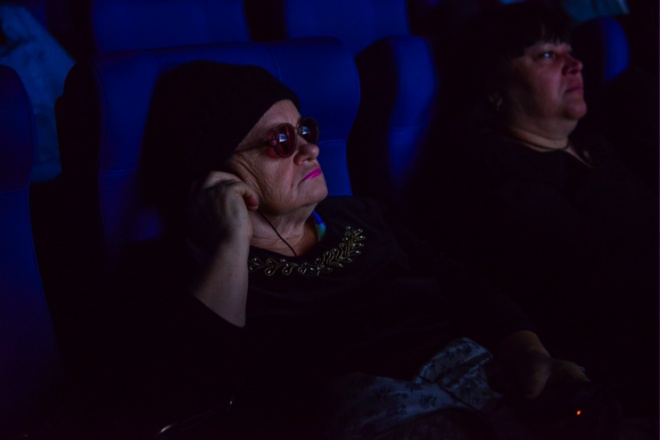
Yuriy Chumak, a human rights activist and the regional coordinator of Docudays UA in the Kharkiv Region, noted that the topic of this year’s Festival is Equal Equalities. Human dignity, freedom, justice and equality are values which form the foundation of the concept of human rights. That is why organizers decided that the human rights festival should begin on the Day of Dignity and Freedom.
“In addition, the topic of equality involves providing equal opportunity to all social strata, minorities, and vulnerable groups,” emphasized the event’s host Maria Yasenovska, the head of the Kharkiv Regional Foundation “Civic Alternative” and a representative of the Coalition Against Discrimination. Therefore, the inclusive screening of a documentary for Kharkiv residents is an important step towards ensuring effective equality.
The documentary The Distant Barking of Dogs (by Simon Lereng Wilmont; Denmark, Finland, Sweden) follows 10-year-old Oleh, whose life has been turned upside down by the ongoing war in East Ukraine. Oleh lives with his cousin and his beloved grandmother in a small house in the village of Hnutove on the frontline. At the 15th International Human Rights Documentary Film Festival Docudays UA, which was held in Kyiv in March this year, the film received the Student Jury Award “for the clear eyes of a child which are happy about simple things, despite the melancholy in the shadow of war.”
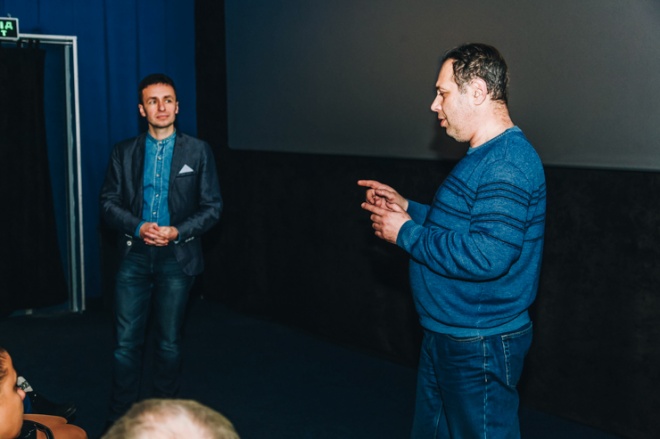
This film moved the audience and caused an active discussion. Nobody was left indifferent about the film. First of all, people talked about sympathizing with the fate of the film’s protagonists who have to live in the area close to the frontline. The sympathy, compassion, respect, surprise… I remember people expressing fascination with the special beauty of the visuals. A young man who had been to the area shown in the film noted that the everyday detail is very accurate.
Here are a few typical comments:
Hanna, a civic activist: “This film confirms, once again, that the war does not have a childish face. The huge eyes of the child which looked at us from the screen made our hearts stop. And I really liked the grandmother, who embodies the image of a real woman — calm, loving, capable of protecting her grandchildren even in the times of war.”
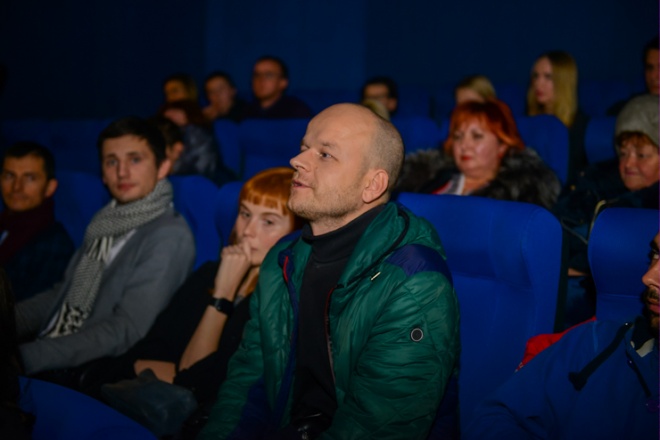
Ihor Pashniev, a lawyer: “Unfortunately, the government doesn’t provide the necessary material or psychological support for the children who suffered from the war. It’s a big problem, because there are thousands, tens of thousands of children who live on the confrontation line, and it’s the government’s duty to take care of them. In April last year, the government issued a decree that approved the Procedure of Providing the Status of a Child Who Suffered from War, which was then changed… However, currently the status is declarative and does not have any consequences.”
Yevhen, an internally displaced student: “I was really struck by the film, because it shows life as it is on the other side of peace, on the frontline. It shows how ordinary people live, how they deal with the war. Personally I distinguished this thin line in how the camera records the everyday things: we see how the locals live, with their checkered bags, constantly on the move… The film shows a Ukrainian soldier, basically only once, who is manning a checkpoint. My position about this is the following: we should be grateful to our soldiers for having an opportunity to watch a film about war in a peaceful city on a peaceful territory, rather than participate in this military conflict. So I wish that all Ukrainians live in peace and win this war as soon as possible.”
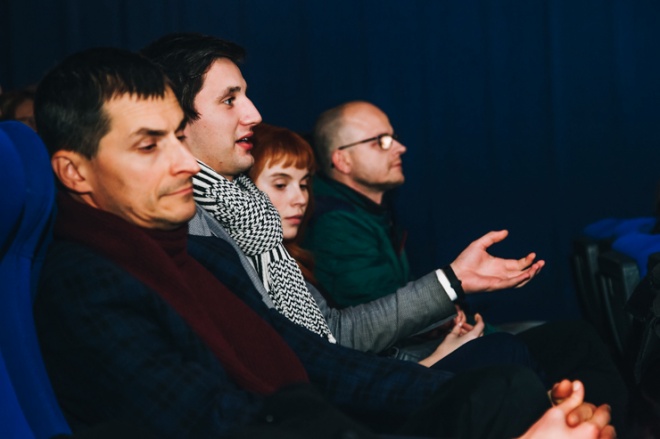
Ihor Shramko, a representative of the Kharkiv Association of Visually Impaired Lawyers: “This unique screening is the first step to the future where all cultural centers will work in the regime of inclusivity. And it’s not just about ensuring equal opportunities, but also about the normal support from the civilized society, which, in the end, will lead to increases in the audience of institutions, with all the positive effects this entails.”
The poetic title of the film creates the mood that can be felt most acutely in the quiet scenes where nothing seems to be happening. The grandmother and the grandson walk on the snow in silence, holding hands. Or they sit, hugging each other, on a river shore… The distant barking of dogs (if it’s really distant) can only be heard when there is no shelling or explosions. It seems that the title itself conveys the film’s message. It’s the hope for peace. Dona nobis pacem (Give us peace).
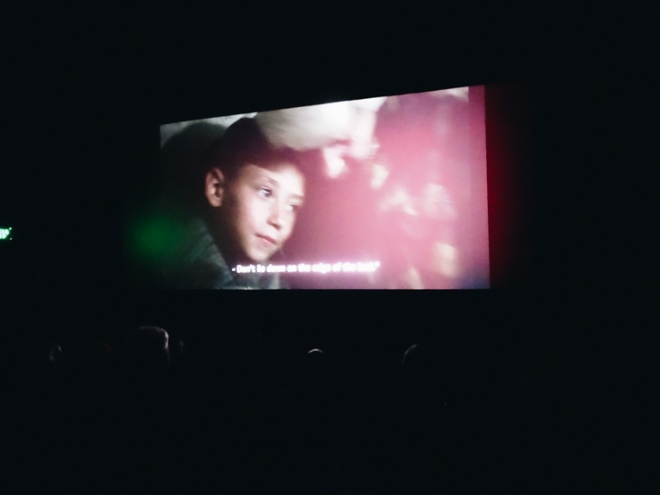
For information: According to the Voice of Ukraine, 285 million people on the planet have visual impairments: 39 million are blind, 246 million have considerably impaired vision. 90 percent of the blind people live in low-income countries. There are no accurate data about the number of people with visual impairments in Ukraine. According to unofficial data, there are about 100,000 of them (more than 10,000 among them are children).
Text: Georgy Kobzar, Volodymyr Kaplun
Photo: Andriy Chumak, Denys Kolisnychenko, Christina Pashkina












